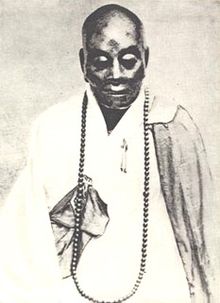
Back هيوننج Arabic هيوننج ARZ Huineng AST Huineng Catalan Chuej-neng Czech Huineng German Huineng Spanish Huineng Basque Huineng French Huineng Galician
Dajian Huineng | |
|---|---|
Chinese: 惠能 | |
 Putative mummy of Huineng's body | |
| Personal life | |
| Born | February 27, 638 Xinxing County, Guangdong, China |
| Died | 713 (aged 74–75) Guo'en Temple, Xinxing County, Guangdong, China |
| Nationality | Chinese |
| Notable work(s) | Platform Sutra of the Sixth Patriarch |
| Posthumous name | Dajian (大鑒) |
| Religious life | |
| Religion | Chan Buddhism |
| Temple | Guangxiao Temple Nanhua Temple |
| Dharma names | Huineng (惠能) |
| Senior posting | |
| Teacher | Daman Hongren |
| Part of a series on |
| Zen Buddhism |
|---|
 |
Dajian Huineng or Hui-neng[1] (traditional Chinese: 大鑒惠能; pinyin: Dàjiàn Huìnéng; Wade–Giles: Ta⁴-chien⁴ Hui⁴-nêng²; Japanese: Daikan Enō; Korean: Daegam Hyeneung; February 27, 638 – August 28, 713), also commonly known as the Sixth Patriarch or Sixth Ancestor of Chan (traditional Chinese: 禪宗六祖), is a semi-legendary but central figure in the early history of Chinese Chan Buddhism. According to tradition he was an uneducated layman who suddenly attained awakening (Chinese: 見性, jianxing)[2] upon hearing the Diamond Sutra. Despite his lack of formal training, he demonstrated his understanding to the fifth patriarch, Daman Hongren, who then supposedly chose Huineng as his true successor instead of his publicly known selection of Yuquan Shenxiu.
Twentieth century scholarship revealed that the story of Huineng's Buddhist career was likely invented by the monk Heze Shenhui, who claimed to be one of Huineng's disciples and was highly critical of Shenxiu's teaching.[3][4][5]
Huineng is regarded as the founder of the "Sudden Enlightenment" Southern Chan school of Buddhism, which focuses on an immediate and direct attainment of Buddhist enlightenment. The Platform Sutra of the Sixth Patriarch (六祖壇經), which is said to be a record of his teachings, is a highly influential text in the East Asian Buddhist tradition.
- ^ Cite error: The named reference
clearywas invoked but never defined (see the help page). - ^ Buswell Robert E, and Lopez Donald S. (2017). The Princeton Dictionary of Buddhism. Princeton University Press. ISBN 9780691157863.
- ^ McRae 2003.
- ^ Jorgensen 2005.
- ^ Schlütter & Teiser 2012.